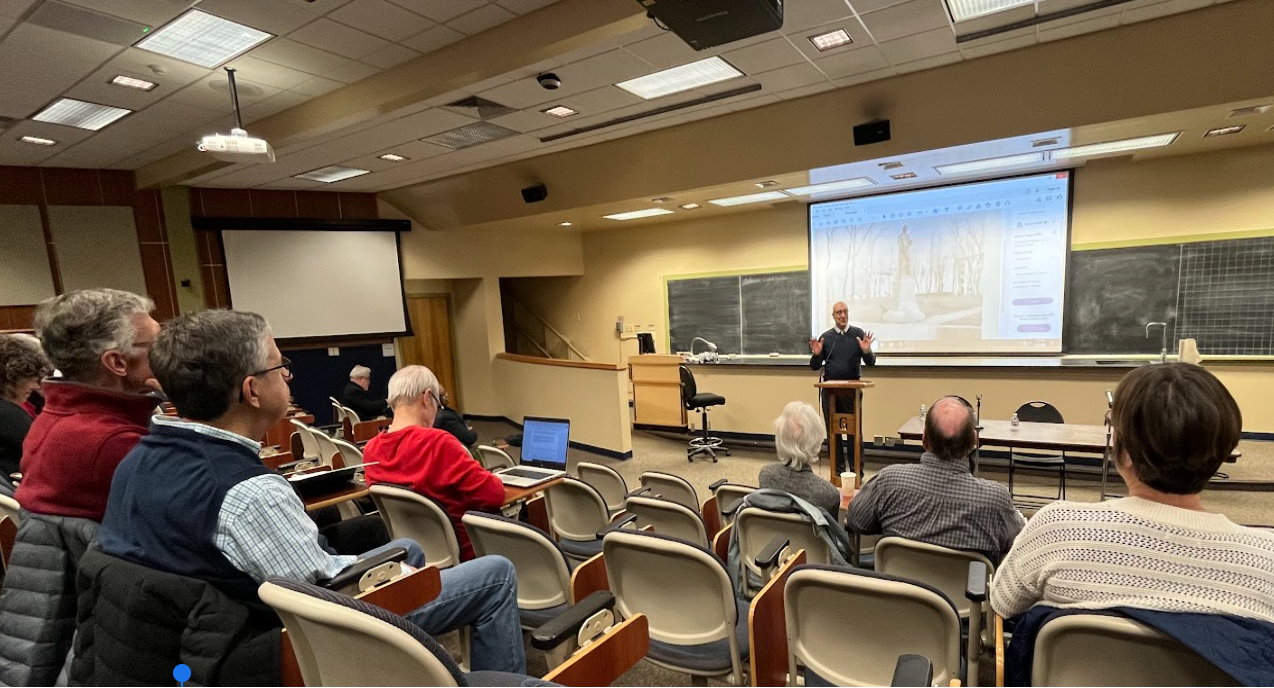By Brandon Fey, Assistant News Editor
In celebration of the 225th birthday of Gettysburg College founder Samuel Simon Schmucker, Gettysburg College hosted a celebratory day of programming in the Mara Auditorium of Masters Hall on Saturday. Students, along with members of the local Lutheran community, were in attendance to learn about Schmuker’s unique and impactful legacy.
Gettysburg College History Professor Dr. Michael Birkner gave a lecture, titled “‘Laying the Foundation of a Superior Education’: Samuel Simon Schmucker’s Pragmatic Vision and the Future of Gettysburg College,” which connected the academic values of the college’s founder to the attributes that have shaped modern liberal arts education.
Birkner began by addressing the image of a statue of Schmucker standing in front of Pennsylvania Hall, which was projected behind him. He stated that despite his profound contributions to Gettysburg, Schmucker remains a largely unknown figure on campus. The image, he explained, was a drawing that was part of a student effort in the late 19th century that sought to construct a statue of Schmucker but was unable to accumulate the funds. To this day, Gettysburg College continues to lack any statue of its founder, and it was not until 1957 that Schmucker was finally recognized with the naming of Schmucker Hall, which was the college’s library at the time.
Birkner discussed Schmucker’s initial goal to found a college to provide an educated Lutheran ministry to the German population in middle Pennsylvania, where there was a lack of formal education and educated ministers in the early 19th century. He founded The Lutheran Theological Seminary at Gettysburg in 1826 and soon realized that a college would be necessary for advancing the education of future ministers and members of the local community.
“He had to rectify that problem by building a college, which if you were to believe a statement that Schmucker made in the 1860s, was part of his original life plan,” Birkner explained.
In 1832, Schmucker, alongside a group of local notables, established Pennsylvania College, which was renamed Gettysburg College in 1921. Birkner stated that Pennsylvania College was founded as Lutheran-influenced, but secular, with no explicit Lutheran teaching or subsidy to both secure funding and to encourage ecumenical education with the unstated understanding that the majority of students would come from local Lutheran communities.
The nonsectarian origins of Gettysburg College corresponded with an antebellum trend in which emerging protestant colleges across the United States sought cooperation among denominations and used the support of local elites. Birkner added that Schmucker allied with prominent statesman, abolitionist and Gettysburg lawyer Thaddeus Stevens to secure the current property of the college.
Birkner then described how the early 1880s were an evolving time for education. He stated that Schmucker was influenced by the debates over the famous Yale Report of 1828, which argued for a single curriculum that upheld the importance of instruction in Latin and Ancient Greek to foster an objectively applicable set of educational skills. Schmucker rejected this argument, as Pennsylvania College focused on the teaching of practical subjects like natural science and foreign languages instead.
The role of religious instruction fluctuated at Pennsylvania College, as different presidents throughout the school’s history held varying views on the emphasis of theology in regard to other subjects. Birkner held that Schmucker’s emphasis on liberal learning remained viable despite skirmishes with alumni who wanted more religious focus as time progressed. Likewise, the College’s commitment to non-sectarianism evolved over time, with a shift toward greater inclusivity.
Birkner explained how the strength of Gettysburg College’s Lutheran identity fluctuated at different times over the history of the college. In one example, he cited an instance when the Carnegie Foundation offered funding for the college if its trustees were to reduce their Lutheran majority. In response, the trustees of Gettysburg College rejected the foundation’s offer and increased the percentage of Lutheran trustees in spite of the notion.
In the later 20th century, college presidents took several contrasting stances on the role of Christianity at Gettysburg College and the Lutheran heritage of the school. Birkner mentioned the increasing secularity of the school, citing that in 1950, 50% of admitted students identified as Lutheran, while in 2024, that number dropped to about 2%.
Birkner concluded his lecture by referring back to Schmucker’s legacy. He credited the founder with having set the foundation for the superior liberal arts education currently offered at Gettysburg College and for having intended for the school to be a place where students of different faiths are welcome to learn.
Despite not having a statue, Birkner stated, “His ethos lives on.”

